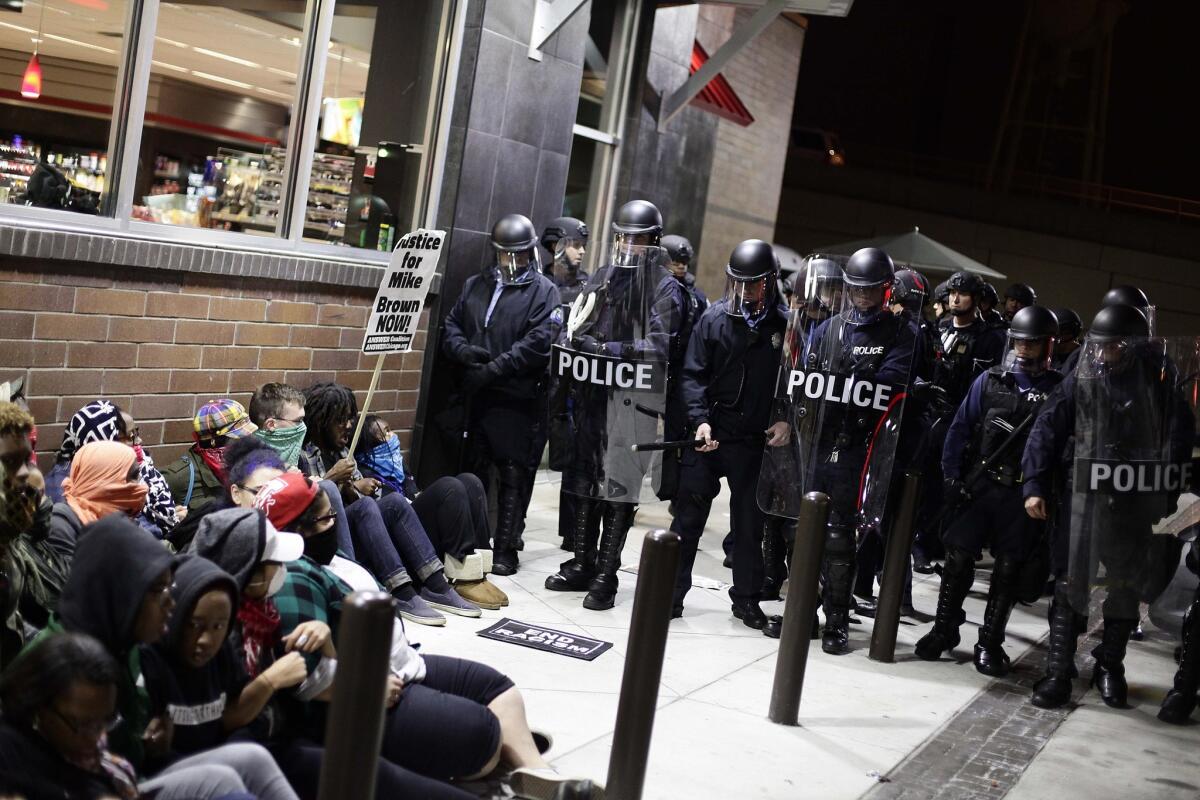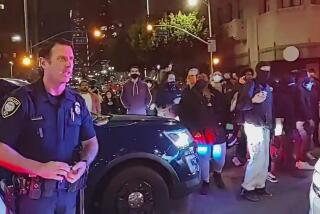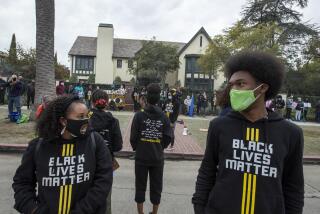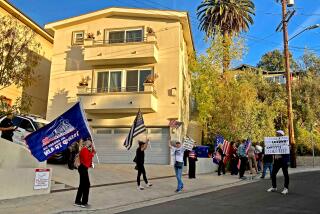17 arrested in St. Louis during ‘Ferguson October’ protest

Reporting from St. Louis — Seventeen demonstrators were arrested in a sit-in outside a QuikTrip here early Sunday as a weekend of “Ferguson October” demonstrations continued to spread out of the suburb of Ferguson and into the city of St. Louis.
“If we don’t get it, shut it down,” has become a key rallying cry for many activists, along with the defining chant of the Ferguson demonstrations: “Hands up, don’t shoot.”
Sunday morning’s arrests capped a long Saturday of dissent that began with at least several hundred people marching through downtown St. Louis to protest shootings and racial inequality. That march finished without incident, as a smaller group of several dozen demonstrators marched on St. Louis Metropolitan Police headquarters.
Then, on Saturday night, hundreds of demonstrators gathered on the street in Ferguson where an unarmed black man, 18-year-old Michael Brown, was shot by white police officer Darren Wilson on Aug. 9, triggering persistent unrest.
The Ferguson protesters, joined by Michael Brown’s mother, Lesley McSpadden, then marched more than 2 miles in the dark to the Ferguson Police Department, as a family representative asked the crowd to be peaceful and not incite the police.
After the group arrived at the Ferguson police station, the crowd massed around a line of police in their regular uniforms before holding a moment of silence, for 4 1/2 minutes, symbolizing each hour that Brown’s body lay in the street after his death. The demonstrators then began playing music on a mobile sound system, which was interrupted when one speaker took the microphone and pointed up at a single star visible in the sky.
“I want y’all to look up in the sky and say, Mike Brown! Mike Brown!” the man said, as the crowd chanted behind him and pointed at the sky.
The demonstration outside the police station, where a couple hundred people gathered, took on divergent moods as some demonstrators shouted at the police, others danced to music and many simply chatted with each other. The relaxed mood disturbed some participants, with one activist tweeting, “We haven’t been out day after day for nine weeks so people can party in front of the Ferguson PD.”
Some demonstrators then began calling for the protest to relocate to the Shaw neighborhood of St. Louis, where 18-year-old Vonderrit Myers Jr. was shot and killed by an off-duty St. Louis city police officer who was working a private security job for a local neighborhood. Police said Myers shot at the officer three times first, but representatives for Myers’ family have insisted he was unarmed.
A march of at least several dozen demonstrators made a surprise stop at a QuikTrip near Shaw, a racially mixed neighborhood in south St. Louis.
The QuikTrip was a notable choice for the demonstrators; rioters looted and burned down a QuikTrip in Ferguson the day after Brown’s death, and the empty convenience store parking lot became a gathering point for the ensuing protests that gripped the city.
At the QuikTrip near Shaw, the situation became more tense than earlier in the evening in Ferguson, where county police reported no property damage or arrests.
“We’re going to march in! [There will be] no stealing or vandalizing of this property,” one masked demonstration leader said on a bullhorn, according to live-streamed footage of the march. “We going to take it over!”
“Something changes when they get to the QuikTrip,” St. Louis Metropolitan Police Chief Sam Dotson told the Los Angeles Times in an interview Sunday. “One of the clerks told me people with masks were pulling on the door trying to get in. You can imagine, if you’re a QuikTrip employee [who knows what happened in Ferguson], you’re probably pretty scared.”
At that point, Dotson said — citing about 50 protesters blocking business and then sitting down and locking arms outside the store, cheering — police in riot gear cleared the demonstrators from the QuikTrip parking lot, pepper-spraying perhaps four to six people.
Officers gave the sitting demonstrators a last chance to leave without arrest, Dotson said, and many left. But 17 stayed and were arrested for failing to disperse. After clearing the parking lot, Dotson said someone threw a rock that hit one of his officers, although the officer wasn’t hurt.
Dotson said his department is trying to take a relaxed approach to crowd control, in contrast to the strict and sometimes overwhelming displays of police force that came to define the early weeks of protest in Ferguson.
“Everybody has the right to be heard. That’s what the First Amendment is,” Dotson said, adding, “I’ll do everything I can to support these events, but the takeover of a QuikTrip is not something I can support.”
Ninety-nine percent of the demonstrators are peaceful, Dotson said. “But there are these agitators who work in the background and try to get the crowd to act up.”
With a grand jury’s decision expected in November over whether to indict Ferguson officer Wilson, Dotson said his agency is preparing for unrest in St. Louis, but he hoped for cooler heads to prevail.
“Ferguson is writing a narrative for St. Louis, for the country, and that narrative isn’t done yet,” Dotson said.
More to Read
Sign up for Essential California
The most important California stories and recommendations in your inbox every morning.
You may occasionally receive promotional content from the Los Angeles Times.











